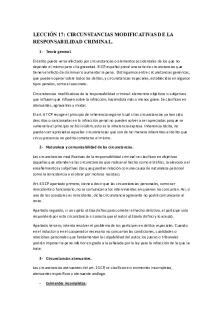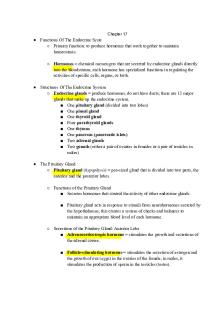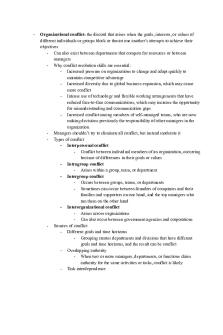Badm 310 ch 17 - Online lecture notes PDF

| Title | Badm 310 ch 17 - Online lecture notes |
|---|---|
| Course | Mgmt And Organizational Beh |
| Institution | University of Illinois at Urbana-Champaign |
| Pages | 6 |
| File Size | 89.5 KB |
| File Type | |
| Total Downloads | 52 |
| Total Views | 166 |
Summary
Online lecture notes...
Description
-
Organizational conflict: the discord that arises when the goals, interests, or values of different individuals or groups block or thwart one another’s attempts to achieve their objectives - Can also exist between departments that compete for resources or between managers - Why conflict resolution skills are essential: - Increased pressure on organizations to change and adapt quickly to maintain competitive advantage - Increased diversity due to global business expansion, which may cause more conflict - Intense use of technology and flexible working arrangements that have reduced face-to-face communications, which may increase the opportunity for misunderstanding and communication gaps - Increased conflict among members of self-managed teams, who are now making decisions previously the responsibility of other managers in the organization - Managers shouldn’t try to eliminate all conflict, but instead moderate it - Types of conflict - Interpersonal conflict - Conflict between individual members of an organization, occurring because of differences in their goals or values - Intragroup conflict - Arises within a group, team, or department - Intergroup conflict - Occurs between groups, teams, or departments - Sometimes can occur between founders of companies and their families and supporters on one hand, and the top managers who run them on the other hand - Interorganizational conflict - Arises across organizations - Can also occur between government agencies and corporations - Sources of conflict - Different goals and time horizons - Grouping creates departments and divisions that have different goals and time horizons, and the result can be conflict - Overlapping authority - When two or more managers, departments, or functions claim authority for the same activities or tasks, conflict is likely - Task interdependence
-
-
Whenever individuals, groups, teams, or departments are interdependent, the potential for conflict arises - With differing goals and time horizons, the managers of marketing and production come into conflict precisely because the departments are interdependent - Different evaluation or reward systems - How interdependent groups, teams, or departments are evaluated and rewarded can be another source of conflict - Scarce resources - When resources are scarce, management is more difficult and conflict is likely - Status inconsistencies - The fact that some individuals, groups, or teams, or departments within an organization are more highly regarded than others in the organization can also create conflict Conflict management strategies - Functional conflict resolution: the conflict is settled by compromise or by collaboration between the parties in conflict - Compromise: a way of managing conflict in which each party is concerned about not only its own goal accomplishment, but also the goal accomplishment of the other party and is willing to engage in a give-and-take exchange and make concessions - Collaboration: a way of managing conflict in which both parties try to satisfy their goals by coming up with an approach that leaves them better off and does not require concessions on issues that are important to either party - Accommodation: a conflict handling approach in which one party, typically with weaker power, gives in to the demands of the other, typically more powerful party - Avoidance: the parties try to ignore the problem and do nothing to resolve their differences - Competition: a conflict handling approach in which each party tries to maximize its own gain and has little interest in understanding the other party’s position and arriving at a solution that will allow both parties to achieve their goals - Strategies focused on individuals - Increasing awareness of the sources of conflict - Linguistic skills can cause conflict - Personalities can cause conflict
-
-
Work teams can get sidetracked when trying to resolve conflict within the group and between individual members - Increasing diversity awareness and skills - Interpersonal conflicts can arise because of diversity - Practicing job rotation or temporary assignments - Sometimes conflict arise because individual organizational members simply do not understand the work activities and demands that others in an organization face - Using permanent transfers or dismissals when necessary - When dysfunctionally high levels of conflict occur among top managers who cannot resolve their differences and understand each other, it may be necessary for one of them to leave the company - Strategies focused on the whole organization - Changing an organization’s structure or culture - Can also effectively resolve conflicts by increasing levels of integration in an organization - Also might need to change the organizational cultures - Altering the source of conflict - When the source of conflict is overlapping authority, different evaluation or reward systems, or status inconsistencies, managers can sometimes effectively resolve the conflict by directly altering its source Negotiation: a method of conflict resolution in which the parties consider various alternative ways to allocate resources to come up with a solution acceptable to all of them - Third-party negotiator: an impartial individual with expertise in handling conflicts and negotiations who helps parties in conflict reach an acceptable solution - Mediator: a third party negotiator who facilitates negotiations but has no authority to impose a solution - Arbitrator: a third party negotiator who can impose what he/she thinks is a fair solution to a conflict, which both parties are obligated to abide by - Distributive negotiation and integrative bargaining - Distributive negotiation: adversarial negotiation in which the parties in conflict compete to win the most resources while conceding as little as possible - The parties see no need to interact with each other in the future and do not care if their relationship gets destroyed
-
-
Integrative bargaining: cooperative negotiation in which the parties in conflict work together to achieve a resolution that is good for them both - Conflicts are handled through collaboration and/or compromise - Strategies to encourage integrative bargaining - Emphasizing superordinate goals - Superordinate goals: goals that both parties agree to, regardless of the source of their conflict - Help parties in conflict to keep in mind the big picture and the fact that they are working together for a larger purpose/goal - Focusing on the problem, not the people - All parties to a conflict need to keep focused on the problem or on the source of the conflict and avoid the temptation to discredit each other - Focusing on interests, not demands - Demands: what the person wants - Interests: why the person wants them - Unlikely that the demands of both parties can be met, but underlying interests can be - Creating new options for joint gain - Once two parties to a conflict focus on their interests, they are on the road to achieving creative solutions to the conflict that will benefit them both - Focusing on what is fair - Emphasizing fairness and distributive justice will help the two parties come to a mutual agreement about what the best solution is to the problem Organizational politics: the activities that managers (and other members) engage in to increase their power and to use power effectively to achieve their goals and overcome resistance or opposition - Political strategies: tactics that managers use to increase their power and to use power effectively to influence and gain the support of other people while overcoming resistance or opposition - Especially important when managers are planning and implementing major changes - The importance of organizational politics - Effective managers engage in politics to gain support for and implement need changes - Organizational politics is a positive force!
-
-
Political strategies for gaining and maintaining power - Controlling uncertainty - Uncertainty can interfere with effective performance and goal attainment - Managers who control uncertainty are more likely to see their power increase - Making oneself irreplaceable - Managers gain power when they have valuable knowledge and expertise that allow them to perform activities no one else can handle - Being in a central position - Managers in key positions have control over crucial organizational activities and initiatives and have access to important information - Generating resources - 3 kinds of necessary resources to be effective: - (1) input resources such as raw materials, skilled workers, and financial capital - (2) technical resources such as machinery and computers - (3) knowledge resources such as marketing, information technology, or engineering expertise - Building alliances - When managers build alliances, they develop mutually beneficial relationships with people both inside and outside the organization Political strategies for exercising power - Focus on how managers can use their power unobtrusively - Relying on objective information - Rely on objective information that supports the manager’s initiatives - Leads others to support the manager because of the facts - Bringing in an outside expert - Provide managers with some of the same benefits that the use of objective information does - Lends credibility to a manager’s initiative - Controlling the agenda - Influences which alternatives are considered or even whether a decision is made - Can also prevent a decision from being made - Making everyone a winner
-
By making sure everyone is a winner, the manager can influence other organizational members because these members see supporting the manager as being in their best interest...
Similar Free PDFs

Badm 310 midterm #4
- 21 Pages

202210 BADM 302 41 online
- 8 Pages

Ch. 17 Notes
- 3 Pages

LecciÓn 17 - Lecture notes 17
- 6 Pages

Chapter 17 - Lecture notes 17
- 15 Pages

Chapter 17 - Lecture notes 17
- 7 Pages

LEC17 - Lecture notes 17
- 28 Pages

CH17 - Lecture notes 17
- 17 Pages

L18 - Lecture notes 17
- 2 Pages
Popular Institutions
- Tinajero National High School - Annex
- Politeknik Caltex Riau
- Yokohama City University
- SGT University
- University of Al-Qadisiyah
- Divine Word College of Vigan
- Techniek College Rotterdam
- Universidade de Santiago
- Universiti Teknologi MARA Cawangan Johor Kampus Pasir Gudang
- Poltekkes Kemenkes Yogyakarta
- Baguio City National High School
- Colegio san marcos
- preparatoria uno
- Centro de Bachillerato Tecnológico Industrial y de Servicios No. 107
- Dalian Maritime University
- Quang Trung Secondary School
- Colegio Tecnológico en Informática
- Corporación Regional de Educación Superior
- Grupo CEDVA
- Dar Al Uloom University
- Centro de Estudios Preuniversitarios de la Universidad Nacional de Ingeniería
- 上智大学
- Aakash International School, Nuna Majara
- San Felipe Neri Catholic School
- Kang Chiao International School - New Taipei City
- Misamis Occidental National High School
- Institución Educativa Escuela Normal Juan Ladrilleros
- Kolehiyo ng Pantukan
- Batanes State College
- Instituto Continental
- Sekolah Menengah Kejuruan Kesehatan Kaltara (Tarakan)
- Colegio de La Inmaculada Concepcion - Cebu






